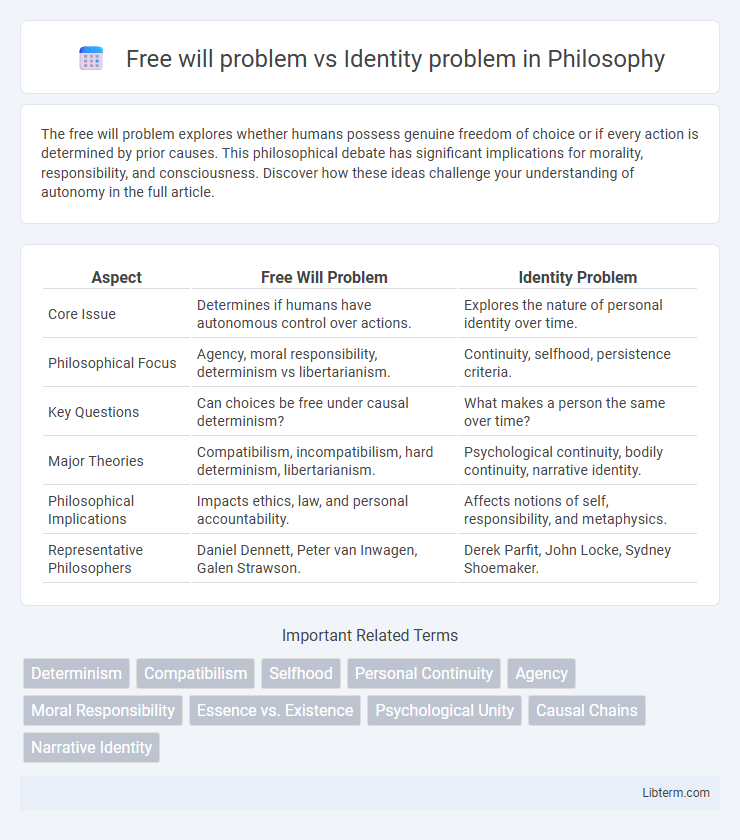The free will problem explores whether humans possess genuine freedom of choice or if every action is determined by prior causes. This philosophical debate has significant implications for morality, responsibility, and consciousness. Discover how these ideas challenge your understanding of autonomy in the full article.
Table of Comparison
| Aspect | Free Will Problem | Identity Problem |
|---|---|---|
| Core Issue | Determines if humans have autonomous control over actions. | Explores the nature of personal identity over time. |
| Philosophical Focus | Agency, moral responsibility, determinism vs libertarianism. | Continuity, selfhood, persistence criteria. |
| Key Questions | Can choices be free under causal determinism? | What makes a person the same over time? |
| Major Theories | Compatibilism, incompatibilism, hard determinism, libertarianism. | Psychological continuity, bodily continuity, narrative identity. |
| Philosophical Implications | Impacts ethics, law, and personal accountability. | Affects notions of self, responsibility, and metaphysics. |
| Representative Philosophers | Daniel Dennett, Peter van Inwagen, Galen Strawson. | Derek Parfit, John Locke, Sydney Shoemaker. |
Understanding Free Will: Core Concepts
The free will problem centers on whether individuals possess autonomous decision-making capacity independent of deterministic forces, a debate rooted in philosophy, neuroscience, and psychology. Core concepts include agency, moral responsibility, and the nature of choice, highlighting tensions between determinism and libertarianism. The identity problem, meanwhile, interrogates the continuity of selfhood over time, questioning how personal identity remains consistent despite physical and psychological changes.
Defining the Identity Problem
The Identity Problem in philosophy addresses the challenge of determining what it means for a person to remain the same over time despite changes. It explores criteria such as psychological continuity, bodily persistence, and memory to define personal identity. This issue contrasts with the Free Will Problem, which examines the nature and extent of human autonomy and moral responsibility.
Historical Perspectives on Free Will
Historical perspectives on free will trace back to ancient philosophers like Aristotle, who debated the nature of human choice and moral responsibility. Medieval scholars, including St. Augustine and Thomas Aquinas, framed free will within theological contexts, emphasizing divine foreknowledge and human agency. The Enlightenment era introduced compatibility theories, exploring how free will could coexist with deterministic laws of nature, significantly influencing contemporary philosophical discussions.
Philosophical Roots of Personal Identity
The Free Will problem examines whether individuals can act independently of deterministic forces, while the Identity problem explores what constitutes personal identity over time. Philosophical roots of personal identity trace back to John Locke's memory theory, asserting continuity through consciousness, contrasted by David Hume's bundle theory denying a fixed self. Contemporary debates integrate metaphysical perspectives on persistence, psychological criteria, and the implications of neurological findings for understanding the self's unity and moral responsibility.
The Intersection: Free Will and Selfhood
The intersection of free will and selfhood reveals how personal identity shapes and constrains autonomous decision-making, highlighting that the sense of agency depends on a coherent self-concept. Philosophical debates emphasize that free will cannot be fully understood without addressing the continuity and unity of identity over time. Neuroscientific studies further suggest that disruptions in self-perception directly impact perceived volitional control, underscoring the entangled nature of free will and personal identity.
Cognitive Science Insights on Agency and Identity
Cognitive science explores the free will problem by examining neural mechanisms underlying decision-making, revealing how agency emerges from complex brain processes rather than purely metaphysical choice. The identity problem is addressed by studying the continuity of self through memory, personality traits, and autobiographical narrative construction, emphasizing the brain's role in maintaining a coherent identity over time. Experimental evidence on brain plasticity and cognitive functions highlights that agency and identity are dynamic, intertwined constructs shaped by both biological and environmental factors.
Determinism’s Challenge to Free Will and Identity
Determinism poses a significant challenge to the free will problem by asserting that every event, including human choices, is the inevitable result of preceding causes, thereby questioning the existence of genuine freedom in decision-making. The identity problem is similarly impacted as determinism implies that personal identity is fixed and shaped entirely by causal chains, challenging the notion of an autonomous, self-determining agent. Philosophical debates continue to explore whether compatibilist models can reconcile determinism with both free will and the persistence of personal identity.
Contemporary Debates: Compatibilism vs. Essentialism
Contemporary debates on free will versus identity pivot around compatibilism, which asserts that free will can coexist with determinism, and essentialism, which emphasizes fixed, inherent characteristics defining personal identity. Compatibilists argue that moral responsibility remains intact even if actions are determined, framing free will as freedom to act according to one's motivations. Essentialists challenge this by claiming that identity is grounded in immutable traits, raising questions about personal continuity and agency under deterministic or materialist perspectives.
Implications for Moral Responsibility and Authenticity
The free will problem centers on whether individuals possess genuine autonomy to make choices, directly impacting moral responsibility by questioning if actions are freely chosen or determined. The identity problem explores the persistence of self over time, influencing authenticity by challenging the continuity of personal character and values essential for moral accountability. Resolving these issues affects legal and ethical frameworks by shaping how responsibility and personal identity are attributed in social contexts.
Future Directions in the Free Will and Identity Debate
Future directions in the free will and identity debate emphasize integrating cognitive neuroscience insights with philosophical theories to better understand agency and personal continuity. Advances in neuroimaging and computational models offer promising approaches to disentangle the mechanisms underlying decision-making and self-identity. Emerging interdisciplinary frameworks aim to reconcile deterministic brain processes with subjective experiences of autonomy and evolving identity over time.
Free will problem Infographic

 libterm.com
libterm.com